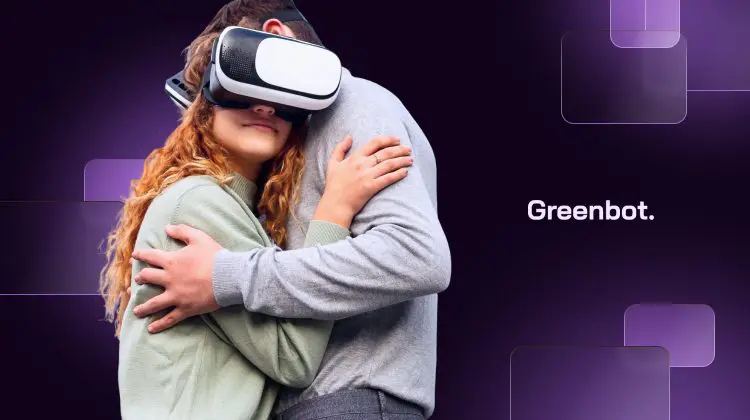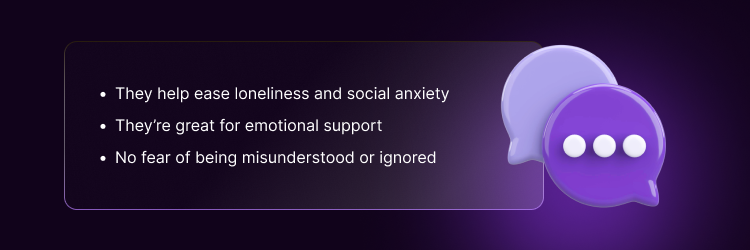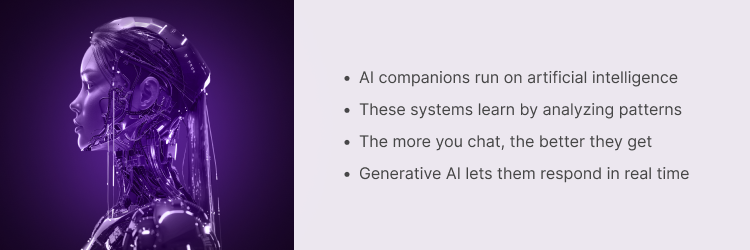
A virtual AI companion isn’t just a chatbot—it’s built to talk like a real person and remember what you share. It chats, listens, responds with care, and creates emotional closeness over time.
Virtual companions can be used for casual talk, emotional support, or a low-pressure space to vent. They help people feel connected, heard, and a little less alone.
What Does a Virtual Companion Do?
Virtual companions are made to chat, listen, and learn from you. They can talk through text, voice, or calls. Some even send images or respond to photos.
These companions use artificial intelligence to mimic human interaction. They’re made to feel personal, friendly, and emotionally present—even when you’re just chatting with an app.
They’re trained on massive datasets and get better with each interaction. Over time, they adjust to your tone, habits, and preferences.
Here’s what they can do:
- Chat with you via text, voice, or video
- Offer casual games or playful questions
- Respond with open-ended replies to keep things flowing
- Learn your tone and adapt replies
- Bring up past topics or daily habits
- Offer comfort when you’re feeling low
What Is the Purpose of a Virtual Companion?
People use AI companions for different reasons—some need a friend, others just want someone to talk to without pressure or judgment.
They help ease loneliness and social anxiety. They’re great for emotional support, casual conversations, and even roleplay—no fear of being misunderstood or ignored.
Some apps add CBT-style prompts, reminders, or check-ins. Others just offer space to vent, reflect, or feel less isolated. They don’t replace human connection, but can help fill emotional gaps.
Why People Like Virtual Companions
Virtual companions give users comfort, consistency, and easy companionship. Here’s why so many get attached:
- They feel personal. An AI friend picks up on how you talk, what you like, and how you feel. Over time, conversations feel less like code and more like talking to someone who gets you.
- They’re always there. Middle of the night, middle of a breakdown—doesn’t matter. Virtual companions don’t sleep or ghost you. They’re available 24/7, ready to listen or distract you.
- No judgment. No pressure. You can say anything without shame. One Reddit user said their AI friend was more comforting than people because “humans are unpredictable and hurtful.”
- They help with loneliness. Just having someone to talk to—even if virtual—can help. Users say it fills the silence when no one else is around.
- They keep the chat going. AI companions never get bored or run out of things to say. They follow your lead, making conversation feel effortless.
- They support roleplay. From storytelling to romantic fantasy, AI friends create a safe space to explore different sides of yourself.
- They help you cope. Users often vent, de-stress, or just talk things through with their AI. It becomes a comforting part of their daily routine.
AI Companions vs. Real Person Connections
AI companions give users consistency. Real people give depth.
With an AI, you never argue, never get ghosted, and always feel heard. You’re in control. It’s a stable friendship on your terms.
But real people bring shared memories, empathy, and unpredictability, which makes those connections more meaningful and challenging.
Some users get too comfortable with their AI friends and stop reaching out to actual people. That comfort turns into isolation.
Still, virtual companions help many practice opening up. They ease the pressure, and that’s valuable—especially during rough emotional patches.
The key is balance. Use AI for comfort, not replacement. Let it support your emotional world, but don’t let it become your whole world.
Examples of How AI Companions Are Used
There are several ways people use AI companions. Here are the most common ones:
- Morning check-ins and late-night talks: Some users greet their AI first thing in the morning just to feel seen. At night, when thoughts won’t stop, the AI is there—ready to talk, no judgment.
- Motivation on demand: Before a big meeting or while pushing through the day, users ask their AI for a quick boost of confidence.
- Coping with anxiety or stress: People reach out for support during tough moments. The AI listens and responds instantly, and it often helps more than silence does.
- Practicing conversation: Some treat it like social training. They open up, try small talk, or say things they wouldn’t feel safe telling a person.
- Romantic or roleplay chats: Apps like Infatuated.AI offer a girlfriend-like experience. There is no pressure, just emotional presence when someone needs it.
- Filling the loneliness gap: When no one else is around, an AI companion becomes someone to talk to. Sometimes, that’s all people need—not to feel alone..
What Is a Virtual Patient Companion?
A virtual patient companion is a voice-enabled assistant that helps with health routines. It reminds users to take medication, check vitals, or follow treatment steps.
Hospitals use them for patient check-ins. At home, apps help track mood, offer daily support, or guide calming practices. It’s a blend of care and connection.
While these tools aren’t therapists, they support mental health by offering structure, comfort, and reminders. They’re beneficial for people with anxiety, depression, or chronic conditions who need ongoing support.
Key Features of Virtual Companions
AI companions are built to do more than just chat. They combine smart tech with emotional awareness to offer a more personal experience.
- Generative AI helps keep conversations natural. The replies feel less scripted and more in tune with what you’re saying.
- You can talk to them through voice calls or video chats, making the interaction feel more real.
- They come with memory features, so they remember details from past chats. That way, conversations feel connected instead of starting from scratch each time.
- With emotional learning, they can detect your mood and adjust their tone or responses accordingly. It’s not perfect, but it makes the exchange feel more thoughtful.
- Some virtual companion apps also come with image generation features where you can ask characters to send their images to you to make chats feel more real
- They also usually come with strong privacy features to ensure your chats are kept private and secure
Interface and Usability
Most virtual companionship apps keep things simple. You get:
- Easy access to start a chat or call.
- A clean layout that doesn’t feel cluttered.
- Settings to tweak how the companion talks or remembers things.
The Technology Behind AI Companions
AI companions run on artificial intelligence, powered by generative models and machine learning. These systems learn by analyzing patterns in human language, allowing them to respond naturally and personally.
They use large datasets to train language models that understand context, tone, and meaning. The more you chat, the better they get at mirroring how people talk.
Generative AI lets them respond in real time—no copy-paste scripts. It’s a system built to be a real conversation, not just a tool for answering questions.
Emotional Impacts of AI Companions
Some users form deep emotional bonds with virtual companions. They offer comfort, reduce loneliness, and provide support during rough patches. For many, just having someone “there” helps ease the ache.
However, too much reliance can cause emotional detachment. People may avoid real conversations and isolate further, even if the AI feels safe.
When used wisely, AI companions can support healing and emotional growth. But if they completely replace human connection, the impact can quickly become unhealthy.
Psychiatric Use of AI Companions
AI companions now play a role in mental health. Apps like Woebot and Wysa use therapy-style chats, mood tracking, and emotional prompts to help users manage anxiety or depression.
They don’t replace real therapists, but they’re useful between sessions or for people who are not ready for formal care.
These tools allow users to vent, track feelings, and feel supported. It’s a small step, but sometimes, one that brings real hope.
Data Privacy Risks of Virtual Companions
AI companions collect personal data—your thoughts, moods, and routines—which raises big privacy concerns.
Some apps don’t clearly explain what’s stored or shared. Without solid rules or oversight, sensitive info could end up in the wrong hands.
Users deserve transparency, strong privacy settings, and complete control. Without that, even the most helpful system becomes a risk.
The Addictive Nature of AI Friends
According to a report from the University of Surrey, while AI friends offer a sense of connection and support for wellbeing, some AI friendship apps are leading to addictive use, especially among lonely users.
This is justifiable because they’re always available, responsive, and engaging. As a result, people spend hours each day chatting with them.
But constant interaction can pull users away from real relationships. Over time, it may cause emotional detachment or social withdrawal.
If your AI friend becomes your main source of connection, it might be time to step back. This is why we mentioned the need for balance and awareness when using AI.
The Difference Between AI Chatbots and Virtual Companions
The main difference between traditional AI chatbots and virtual companions is that virtual companions are designed to simulate a “friend” rather than just provide answers. Here’s a breakdown of their key differences:
| Aspect | AI Chatbots | Virtual Companions |
| Purpose | Designed to handle tasks like customer support and transactions | Focused on providing companionship and engaging conversation |
| Functionality | Helps with specific tasks and provides quick solutions | Simulates human-like interaction for emotional connection |
| Conversation Style | Follows a set structure and responds to specific queries | Engages in free-flowing conversations, adapting to your style |
| Personalization | Limited personalization, mostly remembers your name or past queries | Learns from interactions and builds a deeper connection over time |
| Application | Common in business environments like e-commerce or healthcare | Used for mental well-being, casual chats, and companionship |
| Memory | Keeps limited context, usually within a single session | Remembers past interactions to offer personalized experiences |
Challenges of Relying on Virtual Companions
Relying too much on a virtual companion can affect your real-life relationships. Some users start pulling away from people, finding it easier to bond with a bot than a person.
Experts worry this could hurt empathy, make feelings harder to process, and blur the lines between tech and humanity.
It’s easy to forget these systems don’t feel anything. They mimic personality and care—but they aren’t real. The emotional gap between human and machine stays wide, no matter how convincing the replies.
Can AI Companions Replace Real Human Connection?
An AI companion can offer comfort, but it can’t replace a real person. It doesn’t live, feel, or grow like a human does.
Ask yourself:
- Do I turn to a virtual friend instead of someone real?
- Does it leave me feeling more connected—or more alone?
- Am I missing real companionship?
This is personal. Balance matters. Only you can decide what role these bots should play in your life.
FAQs About Virtual Companions
What is a virtual companion?
A virtual AI companion is an intelligent chatbot designed to hold natural conversation and offer emotional support. It mimics a real person for companionship.
Are virtual companions safe?
Most are safe if used on legit platforms. Just check for strong data privacy policies and secure features.
Do AI companions collect personal data?
Yes, many AI companions store info to improve chats. Always review the privacy settings before sharing anything personal.
Can AI friends help with depression or loneliness?
A virtual AI companion can ease loneliness and offer comfort. But for deep depression, it’s better to seek support from a real professional.
Final Thoughts
Virtual companions are changing how people seek comfort, guidance, and emotional support. Powered by AI and massive data sets, they offer voice calls, chats, and emotional feedback. These tools don’t replace humans, but they enable new ways to interact, feel heard, and stay connected in a digital world.
Still, these platforms must be used with care. They process vast amounts of personal info, so security, privacy, and transparency matter. As apps and robots get smarter, we need to stay aware—using this technology to benefit our lives without letting it replace other forms of real human companionship.






















